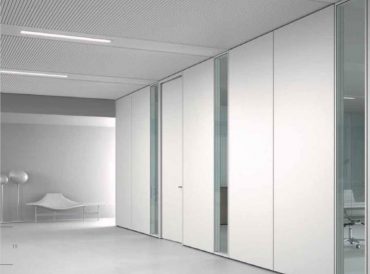The Future of Construction: Embracing Modular Wall Panels

The construction industry is evolving at a rapid pace, driven by technological advancements, sustainability concerns, and the need for efficiency. Among the innovative solutions gaining traction is the use of modular wall panels. These pre-fabricated wall systems are revolutionizing the way we build, offering numerous benefits that make them an attractive option for various types of construction projects. In this blog, we will explore the concept of modular wall panels, their advantages, applications, and the future potential they hold for the construction industry.
What Are Modular Wall Panels?
Modular wall panels are pre-engineered, pre-fabricated sections of walls that are manufactured off-site in a controlled environment. They are designed to be quickly assembled on-site, drastically reducing construction time. These panels can be made from a variety of materials, including concrete, metal, wood, and composite materials, and can be customized to meet specific design and structural requirements.
Advantages of Modular Wall Panels
Time Efficiency
One of the most significant advantages of modular wall panels is the time saved during construction. Traditional construction methods are time-consuming, involving numerous steps such as framing, insulation, and finishing. In contrast, modular wall panels arrive at the construction site ready to be installed, significantly shortening the construction timeline. This efficiency is particularly beneficial for projects with tight deadlines or those requiring rapid completion.
Cost Savings
The use of modular wall panels can lead to substantial cost savings. By reducing construction time, labour costs are minimized. Additionally, the controlled manufacturing environment allows for better resource management, reducing material waste. The precision of factory production also minimizes errors and rework, further lowering overall costs.
Quality Control
Manufacturing wall panels in a controlled environment ensures consistent quality. Each panel is produced under strict quality control measures, resulting in a higher standard of construction compared to on-site building methods. This consistency translates to a more durable and reliable finished product.
Sustainability
Sustainability is a growing concern in the construction industry. Modular wall panels contribute to sustainable building practices in several ways. The factory production process generates less waste, and the materials used can often be recycled or sourced sustainably. Additionally, the energy efficiency of buildings can be enhanced through the use of insulated modular panels, reducing the overall environmental impact.
Design Flexibility
Modular wall panels offer a high degree of design flexibility. They can be customized to fit any architectural style, from modern to traditional. Panels can include built-in insulation, electrical conduits, and plumbing, allowing for seamless integration into the building’s overall design. This flexibility makes them suitable for a wide range of applications, including residential, commercial, and industrial projects.
Applications of Modular Wall Panels
Residential Construction
In residential construction, modular wall panels are used to build single-family homes, multi-family units, and high-rise apartments. The speed and efficiency of panel installation are particularly advantageous in housing developments where multiple units are being constructed simultaneously. Homeowners also benefit from the improved energy efficiency and durability that modular panels provide.
Commercial Buildings
Modular wall panels are ideal for commercial buildings such as offices, hotels, and retail spaces. These projects often require fast turnaround times and minimal disruption, making the quick installation of modular panels a significant advantage. The ability to customize panels to fit specific design requirements also makes them appealing for commercial applications.
Industrial Construction
In the industrial sector, modular wall panels are used for constructing warehouses, factories, and other large-scale facilities. The durability and quality control offered by pre-fabricated panels are crucial in these settings, where structural integrity and longevity are paramount.
Institutional Buildings
Schools, hospitals, and government buildings can also benefit from the use of modular wall panels. The speed of construction reduces downtime and minimizes the impact on daily operations. Additionally, the precision and quality of modular panels ensure that these critical facilities are built to the highest standards.
The Future of Modular Wall Panels
The future of modular wall panels looks promising as the construction industry continues to embrace innovative and efficient building methods. Several trends are likely to drive the increased adoption of modular panels:
Technological Advancements
Advancements in manufacturing technology, such as automation and robotics, are improving the precision and efficiency of modular wall panel production. These technologies enable the creation of more complex and customized panels, expanding their potential applications.
Sustainability Initiatives
As sustainability becomes a more pressing concern, the demand for eco-friendly construction solutions will grow. Modular wall panels, with their reduced waste and energy-efficient properties, align with these sustainability goals, making them an attractive choice for environmentally conscious builders.
Urbanization
The rapid urbanization of cities worldwide is driving the need for efficient and scalable construction methods. Modular wall panels offer a solution that can keep pace with the demand for new buildings, particularly in densely populated urban areas.
Regulatory Support
Government policies and regulations that promote sustainable and efficient building practices are likely to support the adoption of modular wall panels. Incentives for green building practices and streamlined permitting processes for modular construction can further accelerate their use.
Conclusion
Modular wall panels represent a significant step forward in the evolution of construction methods. Their advantages in terms of time efficiency, cost savings, quality control, sustainability, and design flexibility make them a compelling choice for a wide range of projects. As technology continues to advance and sustainability becomes a central focus, modular wall panels are poised to play a crucial role in the future of construction, offering a smarter, faster, and greener way to build.








